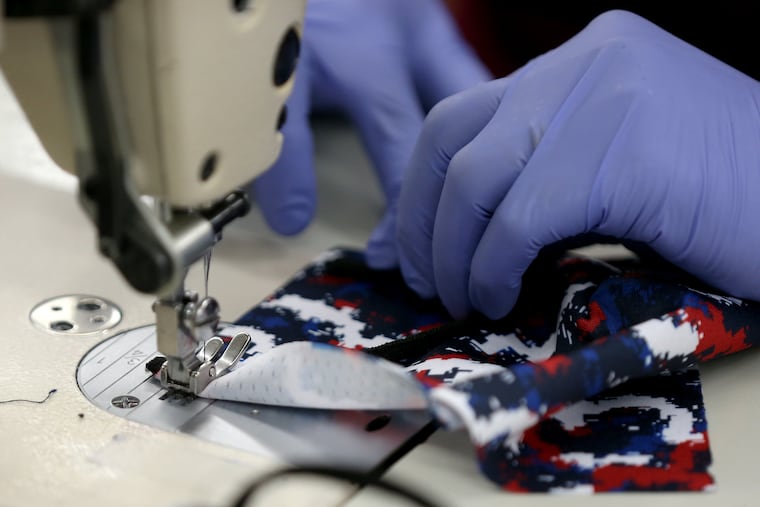Manufacturing decline and climate change both threaten Philadelphia | Opinion
Over the past 20 years, more than 600 Philadelphia manufacturers have closed or moved out of the city — a faster rate of decline than experienced across the country.

The debate in Washington on the size and substance of new federal infrastructure investments has been fraught with attempts to pigeonhole America’s needs through a century-old lens: building and repairing highways and bridges.
To be sure, our transportation infrastructure has very real impacts on our daily lives, but these ongoing discussions ignore other priorities of a forward-looking, 21st-century economic policy — supporting American-made clean energy manufacturing, creating family-sustaining jobs, and building a resilient economy capable of weathering the impacts of climate change.
» READ MORE: As the world burns, D.C. fiddles on climate | Will Bunch Newsletter
As two leaders in the Philadelphia region — one representing the 2nd Congressional District and the other watchdogging the region’s environmental interests as the president of PennFuture — we can attest to how infrastructure investments beyond bridges and roads, such as those proposed in President Joe Biden’s American Jobs Plan, would not only rebuild the Greater Philadelphia region but remake the state as a whole.
Pennsylvania’s 2nd Congressional District is home to 400 world-class manufacturers, providing 15,000 family-sustaining jobs. But over the past 20 years, more than 600 Philadelphia manufacturers have closed or moved out of the city — a faster rate of decline than experienced across the country.
Foreign competition and automation threaten the manufacturing jobs that continue to serve as a bedrock for many of our region’s middle-class families. Making matters worse, workers in Philadelphia have been disproportionately hurt by the pandemic more than other big cities.
Climate change is also disproportionately hurting Philadelphians. The city has already experienced a 360% increase in heavy downpours since the 1950s. According to the Philadelphia Office of Sustainability, many neighborhoods are feeling temperatures up to 22 degrees hotter than surrounding areas because of the heat island effect.
» READ MORE: Pittsburgh offers a better path on energy | Opinion
We can — and should — address Philadelphia’s declining manufacturing base, employment crisis, and climate challenges at the same time. From solar panels and wind turbines to batteries and electric vehicle manufacturing, the solutions to our climate crisis require innovation in advanced manufacturing and a skilled, robust workforce.
For example, a recent report showed that every taxpayer dollar invested in transportation electrification could add nearly $5 to the U.S. gross domestic product. Any federal infrastructure package should include electrifying our transportation infrastructure as a key component.
More work needs to be done to capitalize on other growing clean energy industries, as well. A study found the United States is the world’s largest net importer of light-emitting diode (LED) packages, lithium-ion battery cells, solar photovoltaic (PV) modules, and wind turbines. In other words, we are spending nearly $9 billion to import renewable energy and efficiency products from places like China, when those products can and should be built at home.
“We are spending nearly $9 billion to import renewable energy and efficiency products from places like China, when those products can and should be built at home.”
As Congress continues to shape an infrastructure bill, we need to ensure that it’s history-defining and impactful beyond just new roads and bridges. One way to do so is by extending and expanding tax credits for clean energy manufacturing that takes place in the United States, such as the Innovative Energy Manufacturing Act, which would reward U.S. companies that manufacture clean energy equipment by providing a 30% tax credit. There are similar efforts to target clean energy tax credits to states with higher carbon energy sources, allowing for places like Pennsylvania to gain more support for new, sustainable industries.
Congress should also not lose sight of creating opportunities to rebuild our natural infrastructure — our trees, water, and air. President Biden has proposed creating a $10 billion Civilian Climate Corps that would connect tens of thousands of unemployed or underemployed individuals with good-paying jobs and union opportunities to create community green space, cleaner air, and cleaner water. The 2nd Congressional District would benefit from a CCC that would improve Pennypack Park, the Delaware River, countless neighborhood green spaces, and polluted sites that could be cleaned, reconstructed, maintained, and redeveloped.
The decisions Congress makes in the coming months could expand homegrown clean energy manufacturing, create family-sustaining jobs, and hasten the transition to a sustainable economy more than any effort before it. As we imagine how to fund the infrastructure our society so badly needs, we must also put communities and workers first.
Brendan Boyle represents Pennsylvania’s 2nd Congressional District in Washington, D.C. Jacquelyn Bonomo is president and CEO of PennFuture, an environmental advocacy organization with five offices across Pennsylvania.